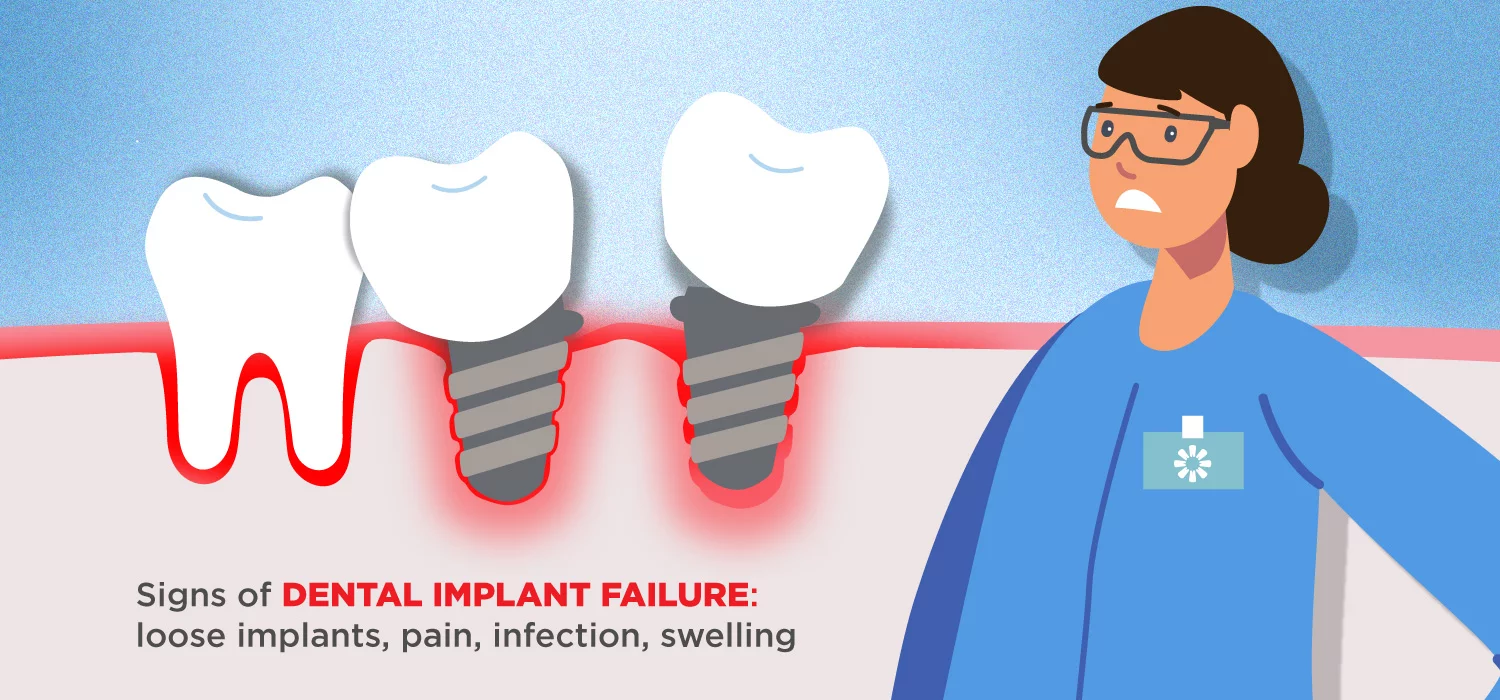A dental implant is a metal fixture surgically connected to the jawbone below the gumline. The implants become anchored to the bone through osseointegration — a process that should make implants permanent. Once inserted, artificial teeth can be mounted on the implant. A person can comfortably speak and eat when the artificial teeth are secured by implants.
Average Lifespan of Dental Implants
There are two main implant types: endosteal and subperiosteal. Multiple factors go into determining the appropriate type for you, including jawbone size, shape, and health. Consult a dental professional to determine the correct option.
Endosteal Implants
Comprised of titanium cylinders or blades, endosteal implants are surgically inserted into the jawbone where the patient is missing teeth. According to the American Academy of Periodontology, they are the most common type of implant.

Subperiosteal Implants
Subperiosteal implants sit on top of the jawbone and under the gums. They connect to the jawbone over time due to osseointegration. There are multiple reasons a dental professional might recommend them, including the following:
• Bone loss in your jaw
• You unable to wear conventional dentures
• Your jaw shape or health is inadequate for surgical insertion of metal needed for endosteal implants

Both implant types are designed to be permanent. The life span depends on how well osseointegration — when the body generates live bone cells around the implant surface — occurs.
So, do dental implants last forever? Most implants have a 90 to 95% success rate after ten years; however, they do not typically last a lifetime and may need to be replaced every 15 to 20 years.
Factors That Affect the Lifespan of Dental Implants
There are numerous factors that determine how long dental implants last. Depending on how diligently some aspects are performed, they can lengthen or shorten, how long a tooth implant lasts.
Lack of Oral Hygiene
Just like oral hygiene is important to protect your teeth, it is also critical to protect your implants. Plaque accumulation can cause gum disease, which can cause significant harm to the gums and the jawbone.
Plaque can affect the area around an implant. This is referred to as peri-implant disease. The initial stage is reversible. Left untreated, it can lead to implant failure.
This is why practicing a good oral care regimen is so critical. That includes brushing at least twice and flossing daily, regular dental checkups every six months, and limiting sugary food consumption.
Inadequate Bone
Endosteal implants need to be firmly anchored to the jawbone. An implant can fail if there’s not enough jawbone to secure it successfully.
The jawbone needs to be thoroughly examined prior to implantation. This includes X-rays and 3D modeling to assess the bone’s quality. If there is insignificant bone to hold the implant, a bone graft or sinus lift could be required.
Teeth Grinding
Grinding your teeth can fracture the implant, loosen or fracture the screw, or crack the porcelain crown. The repetitive grinding motion can cause the implant to move slightly. This movement inhibits the osseointegration process.
Age
Dental implants in seniors are more likely to fail due to underlying medical or bone conditions. The healing process can also be slower in older folks.
Smoking
Dental implants have a shorter life span in people who smoke. Smoking possibly causes implants to fail due to diminished blood flow to the affected area. That negatively impacts the osteointegration and healing processes. Smoking also increases the risk of gum disease.
Medical Issues
Numerous medical conditions have been connected to dental implants failing, including:
• Diabetes
• High blood pressure
• Congestive heart failure
• Osteoporosis
• Bleeding disorders
• Compromised immune systems
Signs of Implant Failure
Dental implants function due to a biological process known as osseointegration. This is when the body produces live bone cells around the implant surface. This secures the implant to the jawbone. Healthy bone continues to grow around the implant, thus strengthening the connection. Problems like dental implant failure can occur when osseointegration doesn’t occur correctly.
A failed dental implant is a rare occurrence. Here are some signs to watch for that indicate your implant is failing.
Mobility
Initially, any mobility will be ever-so-slight or only noticeable by a dentist. As time passes and the implant continues to fail, the implant will feel looser. It could possibly move during chewing and talking actions. The implant will move consistently once it has completely failed.

Pain, Infection, and Swelling
The pain will be quite noticeable as you chew. Infection and swelling are signs of peri-implantitis. Other signs include redness, bleeding, pus, and receding gums.
While these three symptoms can indicate a failed implant, they might not necessarily occur. They are also symptoms of other dental issues, such as cavities or gingivitis. Make a dental appointment if you exhibit any of those symptoms, as you might not have a failed implant but another issue instead.
Your dentist will want to X-ray your mouth around the implant site to determine if a failure has occurred. The X-ray will reveal a substantial loss of bone around the implant’s metal portion.
Implant Failure Treatment
A failed implant needs to be treated. A dentist can remove it using a local anesthetic. The dentist must also determine if the implant can be replaced in the same location.
If bone loss occurs, the patient will need a bone graft to aid tissue regeneration before placing a new implant. The regeneration process could take several months before a new implant can be inserted.
How to Prolong the Lifespan of Dental Implants
Just like with natural teeth, taking care of your dental implants will make them last longer. Many of the best practices for both are the same.
Good Oral Hygiene
Brush regularly to keep teeth and gums clean. Floss or use an interdental brush to clean the hard-to-reach spots around teeth, gums, and metal posts.
Schedule Regular Dental Visits
See your dentist every six months for professional cleanings. They will also examine the health of your implant and the surrounding areas.
Don’t Damage Your Teeth
Avoid chewing on hard objects like candy and ice cubes as that can crack or fracture crowns. Seek treatment if you grind your teeth. Lastly, avoid staining beverages like coffee and tea.
Find a Dentist Near Me
Consult your dentist to discuss any questions about how long does a dental implant last and a dental implant life span. Or, check out The Smile Generation to find a dentist near you for all your mouth health needs. You can read patient reviews, peruse staff bios, and schedule an appointment online with a click of your mouse.
Find your trusted, local dentist today!
Sources
Smile Generation blog articles are reviewed by a licensed dental professional before publishing. However, we present this information for educational purposes only with the intent to promote readers’ understanding of oral health and oral healthcare treatment options and technology. We do not intend for our blog content to substitute for professional dental care and clinical advice, diagnosis, or treatment planning provided by a licensed dental professional. Smile Generation always recommends seeking the advice of a dentist, physician, or other licensed healthcare professional for a dental or medical condition or treatment.








